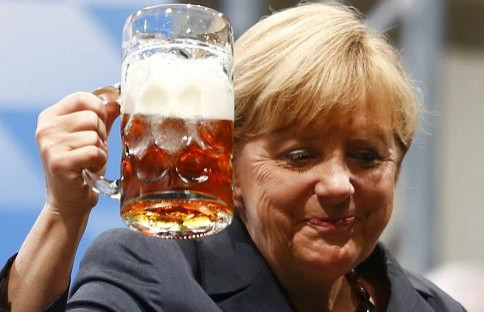German Economy Picks Up Momentum In Q2, Ahead Of Election; UK Growth Continues Amid Call For Quantitative Easing

Germany, Europe's largest economy, and the U.K., its third-largest economy, on Friday released gross domestic product data that provided support to a growing belief that the continent may finally be on its way to a recovery after a long recession.
Germany’s economy registered a year-on-year growth of 0.9 percent in the second quarter of 2013, in line with expectations following a weak first quarter, and ahead of a federal election on Sept. 22, which is considered the most important election of the year in Europe.
The second-quarter data from Germany’s Federal Statistical Office indicated that growth in the country is gaining momentum, driven mainly by domestic demand and government spending, after growth had declined by 1.6 percent in the first quarter of 2013 compared to the corresponding period in 2012, partly due to an unusually long and cold winter. On a quarterly basis, growth in the second quarter rose by 0.7 percent compared to flat growth in the previous quarter.
Exports, one of the key factors driving the German economy, clocked a growth of 2.2 percent when compared to the first quarter of 2013, and the country saw a 0.6 percent growth in employment in the April-June quarter, adding 242,000 jobs since the same period in 2012.
The uptick in GDP comes in the run-up to the German parliamentary election, marred by a conspicuous lack of debate about key issues facing the country and the euro zone, while Chancellor Angela Merkel’s conservative Christian Democrats are seen to be in a commanding position by recent opinion polls.
The U.K. grew 1.5 percent year-on-year in the second quarter of 2013, marginally above expectations, with growing consumer demand and an increase in public and private investments contributing to GDP growth.
When compared to the January-March period, the GDP grew 0.7 percent, revised up by 0.1 percentage points from the previously published estimate, although analysts had predicted that the preliminary estimate would remain unchanged.
The revision in quarter-on-quarter growth was attributed to small upward revisions across several key industrial groupings, the U.K.’s Office for National Statistics said. Based on the preliminary estimate, analysts had said that household spending could be the key factor driving growth in the second quarter.
Compensation of employees, including wages, salaries and pension contributions, surged 2.4 percent in the second quarter -- the highest quarterly increase in 13 years. The increase was attributed partly to unusually high bonus payments in April 2013.
The data was released a day after Martin Weale, a member of the monetary policy committee of the Bank of England, said more quantitative easing is required for stabilizing the economic recovery.
“I would hope the recovery is well entrenched, but anyone who thinks the future will unfold smoothly is not taking account of everything that’s happened in the past five years. I can certainly envisage circumstances in which it would be sensible to undertake further asset purchases,” Weale told the Daily Telegraph.
© Copyright IBTimes 2025. All rights reserved.






















